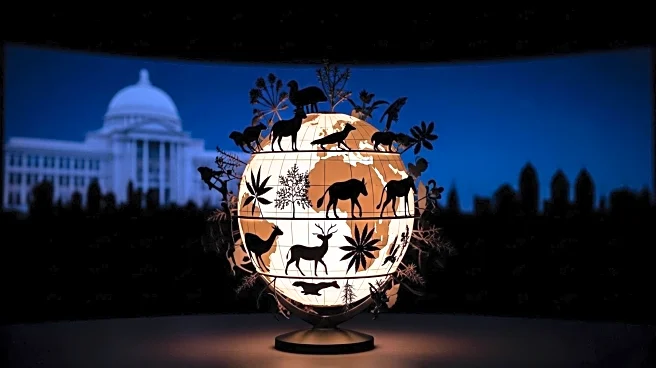What's Happening?
The International Union for Conservation of Nature (IUCN) is set to unveil its updated 'red list' of threatened species during its world congress in Abu Dhabi. This list categorizes plant and animal species from 'least concern' to 'extinct,' highlighting the dire state of global biodiversity. The congress, which occurs every four years, aims to address the increasing threats to biodiversity, including habitat destruction, climate change, and pollution. The previous update revealed that out of 169,420 species studied, 47,187 were classified as threatened, with corals and amphibians being the most affected groups. The congress will also feature discussions on synthetic biology, a controversial technique used in various industries, with motions debating its compatibility with nature conservation.
Why It's Important?
The unveiling of the updated 'red list' is crucial as it sets the global agenda for environmental protection and conservation efforts. The IUCN's findings underscore the urgent need for action to preserve biodiversity, which is essential for maintaining ecological balance and supporting human life. The congress's resolutions, although not legally binding, can influence international treaties and accelerate conservation initiatives. The debate on synthetic biology highlights the ongoing tension between technological advancement and environmental preservation, with potential implications for policy-making and conservation strategies worldwide.
What's Next?
The IUCN congress will vote on resolutions that could shape future conservation efforts and international policies. The outcome of the synthetic biology debate may impact how this technology is integrated into conservation practices. The congress is expected to attract 10,000 delegates and 5,000 civil society attendees, indicating significant interest and potential for collaborative action. The decisions made at this congress could lead to new strategies and partnerships aimed at reversing biodiversity loss and promoting sustainable development.
Beyond the Headlines
The discussions at the IUCN congress may have broader implications for ethical and legal considerations in conservation. The debate on synthetic biology raises questions about the role of genetic engineering in natural ecosystems and its compatibility with conservation values. The congress's focus on biodiversity loss also highlights the cultural and societal shifts needed to prioritize environmental sustainability and the protection of natural habitats.









